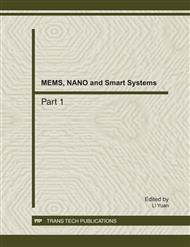p.3357
p.3364
p.3371
p.3376
p.3380
p.3387
p.3392
p.3398
p.3402
Parametric Study of Polymide-Based Micro Thermoelectric Generator (μTEG) Integrated with Micro Fluidic Channel
Abstract:
This paper discloses the design and finite element modeling of a flexible micro thermoelectric generator (TEG), which incorporates microfluidic channel to enhance the role of the heat sink. Polyimide substrate is used to accounts for the flexibility while PDMS microfluidic is chosen in the analysis. A study has been conducted to optimize the design parameters of thermo element length, cross-sectional area and the number of thermocouples acceptable in a prescribed area. The polysilicon thermocouple with 0.7 µm thick and 5 µm width is found to have the optimum length of 36 µm. For a device in the size of 1mm x 1mm and with a 5 K temperature difference across the heat source and heat sink, the open-circuit voltage is 1.373 V and the output power is 0.831 µW/mm2 under matched load resistance. The computational result also shows that by increasing the footprint area of the thermocouples with the step of 1 mm2, a substantial increase in the output voltage and power is observed.observed.
Info:
Periodical:
Pages:
3380-3386
Citation:
Online since:
November 2011
Authors:
Price:
Сopyright:
© 2012 Trans Tech Publications Ltd. All Rights Reserved
Share:
Citation:


